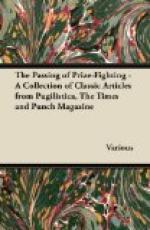* * * * *
TO THE MEN WHO HAVE DIED FOR ENGLAND.
All ye who fought since England was a
name,
Because Her soil was holy
in your eyes;
Who heard Her summons and confessed Her
claim,
Who flung against a world’s
time-hallow’d lies
The truth of English freedom—fain
to give
Those last lone moments, careless
of your pain,
Knowing that only so must England live
And win, by sacrifice, the
right to reign—
Be glad, that still the spur of your bequest
Urges your heirs their threefold
way along—
The way of Toil that craveth not for rest,
Clear Honour, and stark Will
to punish wrong!
The seed ye sow’d God quicken’d
with His Breath;
The crop hath ripen’d—lo,
there is no death!
* * * * *
[Illustration: THE LINKS BEING DEVOTED TO ALLOTMENTS, MR. AND MRS. BUNKER-BROWNE PRACTISE APPROACH SHOTS, WITH THE IDEA OF FILLING THEIR BASKET WITH POTATOES AT THE SAME TIME.]
* * * * *
OUR BOOKING-OFFICE.
(By Mr. Punch’s Staff of Learned Clerks.)
Marmaduke (HEINEMANN) has this peculiarity, that the title role is by no means its most important or interesting character. Indeed it might with more propriety have been called Marrion, since hers is not only the central figure in the plot, but emphatically the one over which Mrs. F. A. Steel has expended most care and affection. Moreover the untimely death of Marmaduke leaves Marrion to carry on the story for several chapters practically single-handed. I am bound to say, however, that at no stage did she get much help from her colleagues, all of whom—the gouty old father and his intriguing wife, the faithful servant, even debonair Marmaduke himself—bear a certain air of familiarity. But if frequent usage has something lessened their vitality, Marrion is a living and credible human being, whether as daughter of a supposed valet, adoring from afar the gay young ensign, or as the unacknowledged wife of Marmaduke and mother of his child, or later as an army nurse amid the horrors of Crimean mismanagement. Later still, when the long arm of coincidence (making a greater stretch than I should have expected under Mrs. Steel’s direction) brought Marrion to the bedside of her parent in a hospital tent, and converted her into a Polish princess, I lost a little of my whole-hearted belief in her actuality. There are really two parts to the tale—the Scotch courtship, with its intrigues, frustrated elopements, et hoc genus omne; and the scenes, very graphically written, of active service at Varna and Inkerman. I will not pretend that the two parts are specially coherent; but at least Mrs. Steel has given us some exceedingly interesting pictures of a period that our novelists have, on the whole, unaccountably neglected.




